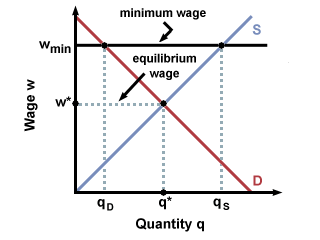Consequences of repealing minimum wage rates.
If there were no minimum wage many additional lower wage jobs would be created.
The vast majority of those newly induced jobs would be what we now describe as sub-minimal wage paying jobs that do not justify the current $7.25/Hr. federal minimum wage rate.
Its not inconceivable that the market price for such sub-minimum tasks may be as low as a half dollar per hour. How much can we pay for someone to straighten salvaged carpenter nails for reuse? We could reduce the price of transportation by replacing many NY City cabs and drivers with young men operating rickshaws.
[U.S. railroads have been in disrepair for over a quarter of a century. Our trains run at 50MPH but in Asia and Europe theyre running trains at 200 to 300 MPH. They have much fewer automobiles and consume less petroleum per capita but their public transportation is generally more wide spread and effective].
Do you think enabling rickshaws to be financially viable by eliminating our minimum wage regulations would decrease our transportation, energy and pollution problems?]
There are many job tasks that do not justify the minimum rate but they now exist because their performance is necessary to our public or private enterprises. Those jobs will continue to exist but their wage levels will plunge down to sub-minimum rates.
Sub-minimum jobs will be the vast majority of additional jobs created and (because many of those qualified to perform sub-minimum tasks were previously not qualified for employment at minimum wage rates), well have a pool of eligible labor that will far exceed the number of those additional jobs.
The affect of those extremely poor paying jobs will ripple throughout our entire labor market. All labor compensation will be somewhat affected but the general extent of the effect upon a tasks wage rate will be inversely related to the difference between the purchasing power of the eliminated minimum wage rate and the jobs rate; (i.e. the more youre earning, the less youre hurting. Thats the meaning of minimum wage rates inverse affect upon all jobs rates).
Lower wage earners will all then be paid in wages of extremely poor purchasing power. Prior to the elimination of the minimum wage rate, many of those now earning the lesser purchasing powered wages will have been unemployed or not worked steadily but they will be joined by those who already had been the working poor and some who were previously getting by slightly better. Therell be net increased needs for public assistance and our states cant now handle the present needs.
Thats a scenario of increased national poverty.
I m a proponent of an annually cost of living adjusted minimum wage rate similar to the annually COLAd Social Security benefits.
Respectfully, Supposn
If there were no minimum wage many additional lower wage jobs would be created.
The vast majority of those newly induced jobs would be what we now describe as sub-minimal wage paying jobs that do not justify the current $7.25/Hr. federal minimum wage rate.
Its not inconceivable that the market price for such sub-minimum tasks may be as low as a half dollar per hour. How much can we pay for someone to straighten salvaged carpenter nails for reuse? We could reduce the price of transportation by replacing many NY City cabs and drivers with young men operating rickshaws.
[U.S. railroads have been in disrepair for over a quarter of a century. Our trains run at 50MPH but in Asia and Europe theyre running trains at 200 to 300 MPH. They have much fewer automobiles and consume less petroleum per capita but their public transportation is generally more wide spread and effective].
Do you think enabling rickshaws to be financially viable by eliminating our minimum wage regulations would decrease our transportation, energy and pollution problems?]
There are many job tasks that do not justify the minimum rate but they now exist because their performance is necessary to our public or private enterprises. Those jobs will continue to exist but their wage levels will plunge down to sub-minimum rates.
Sub-minimum jobs will be the vast majority of additional jobs created and (because many of those qualified to perform sub-minimum tasks were previously not qualified for employment at minimum wage rates), well have a pool of eligible labor that will far exceed the number of those additional jobs.
The affect of those extremely poor paying jobs will ripple throughout our entire labor market. All labor compensation will be somewhat affected but the general extent of the effect upon a tasks wage rate will be inversely related to the difference between the purchasing power of the eliminated minimum wage rate and the jobs rate; (i.e. the more youre earning, the less youre hurting. Thats the meaning of minimum wage rates inverse affect upon all jobs rates).
Lower wage earners will all then be paid in wages of extremely poor purchasing power. Prior to the elimination of the minimum wage rate, many of those now earning the lesser purchasing powered wages will have been unemployed or not worked steadily but they will be joined by those who already had been the working poor and some who were previously getting by slightly better. Therell be net increased needs for public assistance and our states cant now handle the present needs.
Thats a scenario of increased national poverty.
I m a proponent of an annually cost of living adjusted minimum wage rate similar to the annually COLAd Social Security benefits.
Respectfully, Supposn





